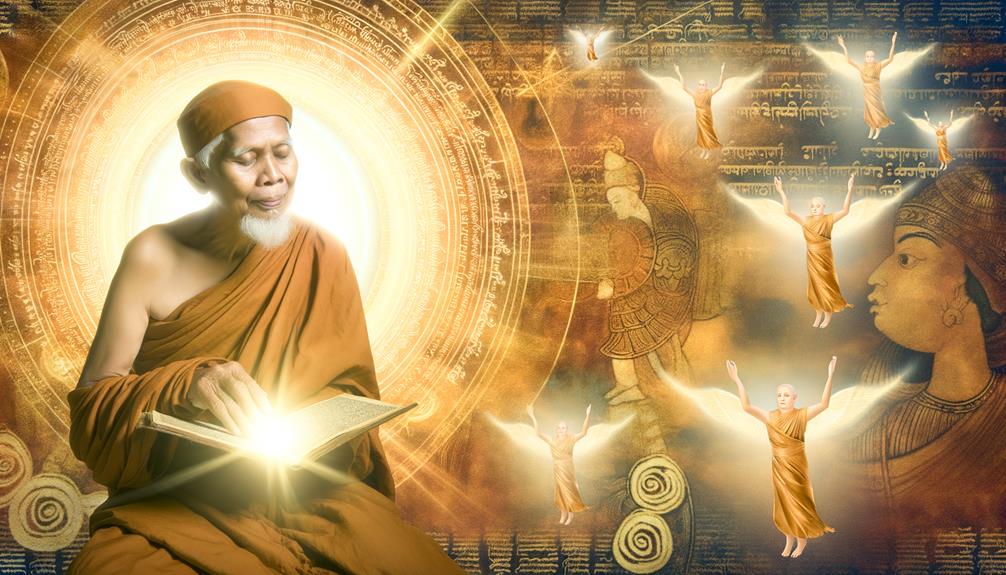Biblical Meaning of the Name Enoch
The name Enoch, derived from the Hebrew root 'Ḥănôḵ,' means 'dedicated' or 'initiated,' underscoring a life set apart for divine purposes. In the Hebrew Bible, Enoch is a pivotal figure, positioned genealogically as the father of Methuselah and the great-grandfather of Noah.
His distinction lies in having 'walked with God' and being taken by God without experiencing death, symbolizing exceptional righteousness and divine favor. Enoch's narrative explores profound theological themes, including divine closeness and eschatological hope.
To understand the depth and implications of Enoch's biblical significance, further exploration is essential.

Key Takeaways
- The name Enoch is derived from the Hebrew root 'Ḥănōḵ', meaning 'dedicated' or 'initiated'.
- Enoch is noted for his divine ascension, where 'God took him', indicating exceptional righteousness.
- Enoch 'walked with God', signifying a life of unwavering faith and divine favor.
- He is a significant figure in biblical genealogy, being the father of Methuselah and an ancestor to Noah.
- Enoch's life and ascension symbolize ultimate hope and reward for faithful and righteous living.
Origin of the Name Enoch
The name 'Enoch,' derived from the Hebrew root 'Ḥănōḵ,' is traditionally interpreted to mean 'dedicated' or 'initiated.' This etymological foundation suggests a sense of consecration or the commencement of a significant journey.
In theological terms, this name encapsulates the idea of a life set apart for divine purposes, signifying an individual called to a unique path of spiritual or moral significance. The linguistic roots of Ḥănōḵ offer a profound context for interpreting Enoch's role and character within various religious texts.
Enoch in the Hebrew Bible
Enoch, a pivotal figure in the Hebrew Bible, is noted for his significant genealogical placement within the lineage of Adam, being the father of Methuselah and ancestor to Noah.
His narrative reaches a theological zenith with his exceptional divine ascension, where 'God took him' (Genesis 5:24), implying a unique departure from earthly life.
This ascent underscores Enoch's unparalleled righteousness and favor with God, making his story a cornerstone for subsequent theological reflections.
Enoch's Genealogy and Lineage
Positioned within the genealogical framework of the Hebrew Bible, Enoch emerges as a pivotal figure whose lineage traces back to Adam, underscoring his significance in biblical history. Enoch is identified as the son of Jared and the father of Methuselah, situated in the seventh generation from Adam (Genesis 5:18-24).
This placement is notable as it accentuates both his ancestral heritage and his role within the antediluvian patriarchal lineage. The genealogical lists in Genesis serve not merely as historical records but as theological constructs emphasizing divine providence and human continuity.
Enoch's inclusion highlights his unique relationship with divinity, setting the stage for later theological interpretations and his elevated status within the canonical texts.
Enoch's Divine Ascension
Integral to understanding Enoch's significance is his divine ascension, a narrative that distinguishes him uniquely among the antediluvian patriarchs in the Hebrew Bible. Enoch, the seventh generation from Adam, is described in Genesis 5:24 as having 'walked with God,' leading to his direct translation into heaven without experiencing death.
This exceptional event is further corroborated by the author of Hebrews (Hebrews 11:5), who states that Enoch was taken up so that he would not see death, emphasizing his righteousness and faith. The theological implications of Enoch's ascension signify a profound divine favor and prefigure later eschatological themes of bodily transformation and eternal life, thereby enriching Judaic understandings of divine-human relationships and post-mortem existence.
Enoch: Son of Cain
As the firstborn son of Cain, Enoch holds a unique and complex position within the biblical narrative, embodying both the continuation and the divergence of his father's legacy.
Enoch's significance is underscored by several key aspects:
- City Builder: Enoch is credited with founding a city, named after himself, symbolizing the establishment of urban civilization.
- Symbol of Progress: His role as a city builder reflects humanity's progression from nomadic life to settled communities.
- Moral Ambiguity: As Cain's son, Enoch inherits the shadow of his father's sin, yet he also represents the potential for redemption and renewal.
These elements collectively illustrate Enoch's pivotal role in the early biblical context, highlighting both human achievement and the enduring consequences of sin.
Enoch: Ancestry and Descendants
Enoch's ancestry and descendants form an essential link in the biblical genealogical record, bridging pivotal figures and narratives that shape theological understanding of human history and divine intervention.
As a descendant of Seth, Adam's third son, Enoch is positioned within a lineage that underscores the continuity of God's covenantal promises.
Enoch's son, Methuselah, whose longevity is legendary, extends this lineage to Noah, a critical figure in the narrative of divine judgment and mercy.
This genealogical chain underscores the transmission of divine blessing and human responsibility, highlighting the intersection between divine providence and human agency.
Through Enoch's lineage, the biblical narrative intricately weaves themes of faithfulness, divine favor, and the perpetuation of God's salvific plan for humanity.
Enoch's Walk With God
Enoch's walk with God serves as a profound illustration of his divine relationship, characterized by an unwavering life of righteousness.
This exceptional communion with God ultimately led to his unique experience of heavenly transcendence, as he was taken up without experiencing death.
These aspects collectively underscore Enoch's exemplary spiritual journey and its theological significance.
Enoch's Divine Relationship
The biblical account of Enoch's life highlights a profound and exceptional relationship with God, characterized by his consistent and devout walk in divine fellowship. This unique bond can be analyzed through several key aspects:
- Intimacy with God: Enoch's walk with God signifies a deep, personal communion, suggesting a life lived in close spiritual proximity.
- Divine Favor: Such a relationship indicates special divine favor, as Enoch was one of the few individuals who did not experience death, being taken up by God instead.
- Spiritual Obedience: Enoch's life exemplifies unwavering commitment and obedience to divine will, serving as a model of faithfulness.
Thus, Enoch's divine relationship underscores an unparalleled spiritual intimacy, marked by exceptional privileges and unwavering devotion.
Life of Righteousness
A life of righteousness, epitomized by Enoch's walk with God, is characterized by an exceptional adherence to moral and spiritual principles as depicted in the biblical narrative. Enoch's life, as outlined in Genesis 5:21-24, serves as a paradigm of unbroken communion with the Divine.
His existence is marked by unwavering faith and consistent pursuit of godliness, reflecting a profound internalization of divine commands. Enoch's righteousness is not merely ritualistic but is genuine, manifesting in daily life and actions.
His walk with God conveys a dynamic relationship that transcends superficial observance, delving into an intimate, transformative fellowship. This theological construct underscores the crucial importance of aligning one's life with divine will, as evidenced by Enoch's exemplary conduct.
Heavenly Transcendence
Building upon the foundation of a righteous life, Enoch's walk with God culminates in a unique heavenly transcendence, illustrating an unparalleled spiritual elevation as recorded in Genesis 5:24. This passage signifies Enoch's extraordinary relationship with the Divine, which led to his being taken by God without experiencing death.
This event encapsulates several theological implications:
- Divine Favor: Enoch's intimate communion with God reflects divine favor and approval.
- Eschatological Symbolism: His transcendence prefigures the ultimate promise of eternal life for the righteous.
- Moral Paradigm: Enoch serves as a model for devout living, demonstrating that a life of holiness can lead to divine transcendence.
Thus, Enoch's life and ascension encapsulate profound spiritual truths within the biblical narrative.
Enoch in the Book of Genesis
Enoch, a prominent figure in the Book of Genesis, is introduced as the seventh generation from Adam, noted for his exceptional piety and the unique manner of his departure from earthly life. Genesis 5:21-24 succinctly narrates Enoch's life, emphasizing his intimate walk with God, a phrase denoting a profound spiritual relationship.
Unlike other patriarchs, Enoch did not experience death; rather, 'God took him,' implying divine intervention and favor. Theologically, Enoch's narrative underscores themes of faith and divine communion, elevating him as a paragon of righteousness.
His brief yet potent biblical account invites contemplation on the nature of divine-human interaction and the potential for transcendence, making Enoch a significant, though enigmatic, figure in Genesis.
Enoch in Religious Texts
Throughout various religious texts, Enoch's portrayal extends beyond the Book of Genesis, offering a multifaceted view of his spiritual significance and the broader implications of his exemplary life.
In the Apocryphal Book of Enoch, his role expands into a prophet who receives divine revelations.
The New Testament references him in Hebrews 11:5, highlighting his faith and pleasing God.
Additionally, the Quran mentions Enoch (Idris) as a prophet granted elevated status by Allah.
These texts collectively underscore three key aspects:
- Prophetic Revelation: Enoch as a recipient of divine knowledge.
- Exemplary Faith: His unwavering fidelity to God.
- Divine Favor: Elevated status in diverse religious traditions.
Such portrayals contribute to a thorough theological understanding of Enoch.
Interpretations of Enoch's Ascension
Scholars have long debated the theological implications of Enoch's ascension, examining its significance within the broader context of divine-human interaction.
Enoch's translation to heaven, as described in Genesis 5:24, has been interpreted as a unique manifestation of divine favor and righteousness. The absence of death in Enoch's narrative suggests an exceptional communion with God, often seen as a precursor to eschatological themes of resurrection and eternal life.
Some scholars argue that Enoch's ascension underscores the potential for human beings to attain divine closeness, while others view it as a symbolic representation of spiritual transcendence. This enigmatic event invites theological reflection on the nature of divine selection and the possibilities inherent in a life aligned with God's will.
Spiritual Lessons From Enoch
In reflecting upon Enoch's life and ascension, one discerns profound spiritual lessons that illuminate the potential depths of faith and righteousness in human experience. Enoch's exemplary walk with God, as detailed in Genesis, underscores a life dedicated to divine communion and moral integrity.
Key spiritual lessons include:
- Intimacy with the Divine: Enoch's close relationship with God exemplifies the transformative power of deep spiritual communion.
- Righteous Living: His life serves as a model for living righteously, embodying the virtues of faith, obedience, and piety.
- Eternal Hope: Enoch's ascension without experiencing death symbolizes the ultimate hope and reward for those who earnestly seek and walk with God.
These lessons remain relevant, encouraging believers to pursue spiritual excellence.
Conclusion
Enoch emerges as a pivotal biblical figure, embodying the pursuit of divine favor and spiritual elevation. His legacy, chronicled through various religious texts, underscores themes of righteousness and transcendence.
Enoch's mysterious ascension invites theological discourse, resembling prophetic figures like Elijah. His narrative, woven into the fabric of Genesis and beyond, serves as an archetype of devout piety and celestial communion, offering profound spiritual lessons and reinforcing the enduring quest for divine intimacy in the human experience.






